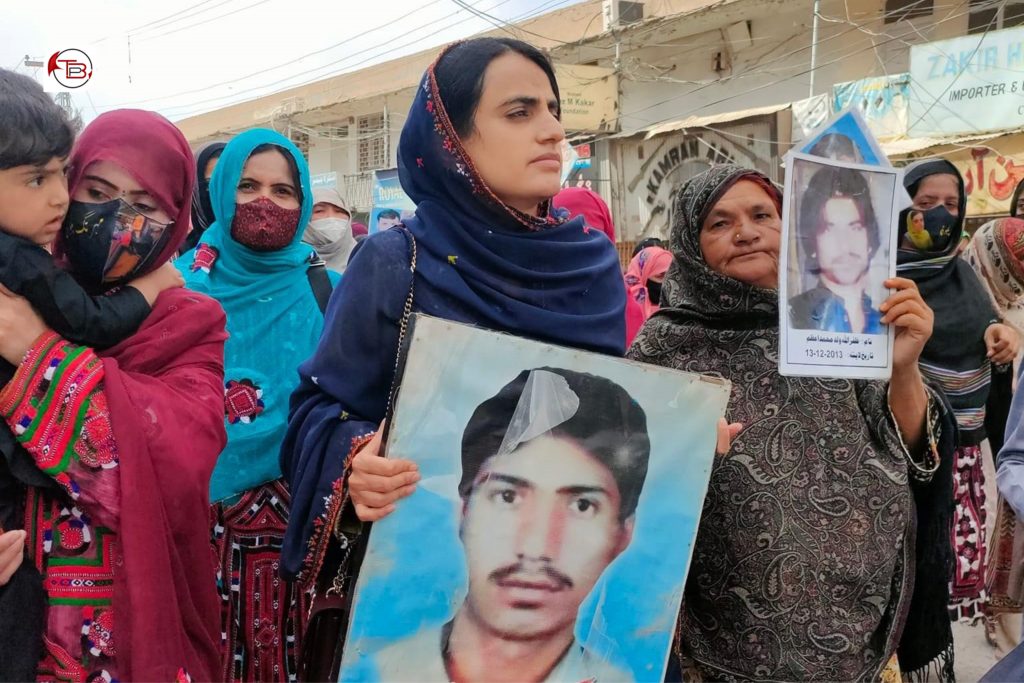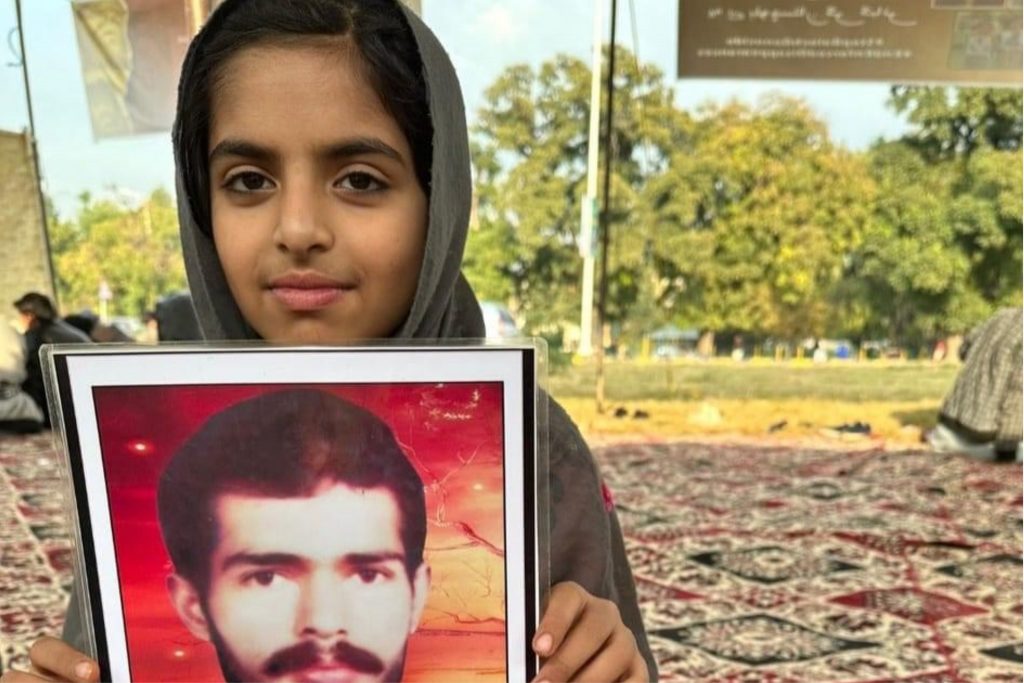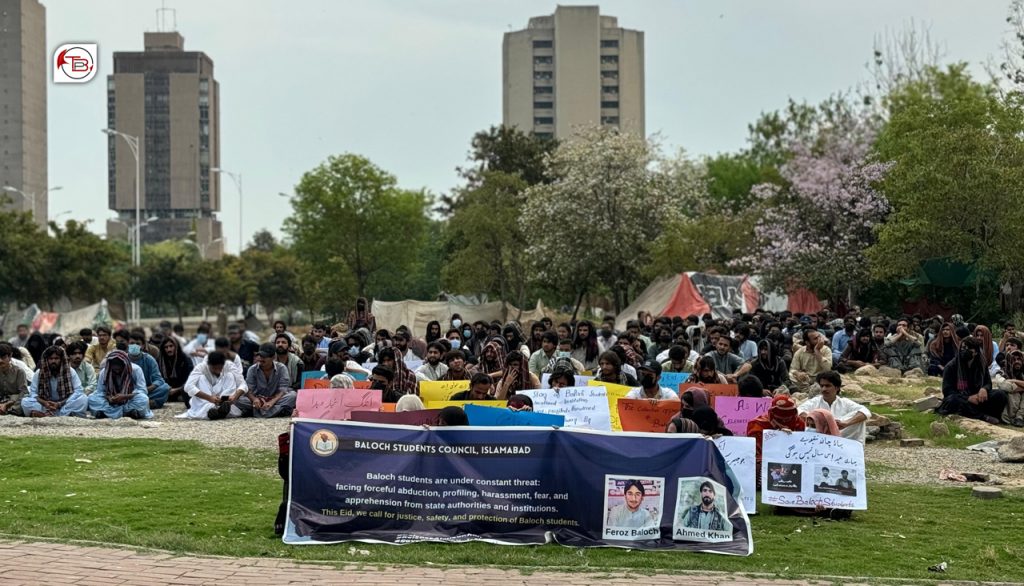As the Muslim community worldwide observed Eid-ul-Fitr, hundreds of families in Balochistan took to the streets in various cities to protest against enforced disappearances and advocate for the safe return of their missing loved ones. Marking the 16th consecutive year of such demonstrations, carried out on Eid, the families were joined by human rights organizations, activists, political figures, social workers, and the broader public.
The Baloch Yakjehti Committee (BYC) and the Voice for Baloch Missing Persons (VBMP), both of which campaign against enforced disappearances and for the recovery of the Baloch missing persons, organized protests in multiple cities of Balochistan, as well as Karachi and Islamabad, calling for the safe release of the missing persons.
On Eid, thousands assembled and marched through the streets of various cities, including Quetta, Khuzdar, Turbat, Hub Chowki, Mastung, Kalat, Panjgoor, Gwadar, Kohlu, Awaran, Dalbandin, Mungachar, Bhaag, Naal, Sibbi, Nasirabad, Barkhan, and Kharan. The BYC also held demonstrations in Karachi and Islamabad on the same day.
Predominantly composed of women and children, the protestors demanded the safe return of their fathers, brothers, sons, and husbands. The annual Eid demonstrations serve as a plea for global awareness of the human rights crisis in Balochistan.
Participants brought along new clothes and shoes for their missing family members, symbolizing their hope for their return.
Mama Qadeer Baloch, Vice-Chairman of VBMP and a human rights activist, stated that enforced disappearances have persisted in Balochistan for two decades, with families protesting for the last 16 years, particularly during Eid. He emphasized the extensive suffering caused by the absence of thousands from the region. He argued that if these missing individuals are accused of crimes, they should be legally processed and tried in court.
Dr. Mahrang Baloch, a BYC leader, joined the Quetta rally, asserting that protests were held in 25 cities across Balochistan for the safe return of the missing persons. She criticized state institutions for their lack of interest in resolving the issue. She reported that in the previous month, 25 people were forcibly disappeared, and two individuals from Karachi were killed in what she described as a staged encounter, with their bodies discarded afterward.
She contrasted the global Eid celebrations with the somber reality in Balochistan, where families continue to protest for the safe return of their loved ones.

Dr. Mahrang Baloch expressed that only those who have endured the loss of a family member to enforced disappearances or extrajudicial killings can truly comprehend the anguish of the families protesting on Eid. She criticized the state for exacerbating the issue and making it controversial rather than resolving it and vowed to continue protesting until all missing persons from Balochistan are returned home.
Marching alongside Dr. Mahrang Baloch in Quetta was nine-year-old Masooma, accompanied by her grandmother, advocating for her father’s safe return. Masooma, who has never met her father as he was taken before she was born, shared her sorrow, saying, “Other girls go for Eid shopping with their fathers. They go to amusement parks and on rides. Who will I go with?”
She brought the clothes and ‘chawat’ (traditional Balochi sandals) prepared for her father, hoping he would return to wear them for Eid. Clutching these items, she expressed her yearning for his return, “My grandmother buys new clothes and sandals for my father every year, hoping that when he returns, he will have something to wear for Eid.” She pleaded with the Pakistani state for compassion and the return of her father.

Other demonstrators echoed similar sentiments, arguing that the practice of enforced disappearances indicates the Pakistani state’s bias against the Baloch people. They said that such actions not only inflict collective suffering but also fuel resentment towards the state in Balochistan. The protestors asserted that the state’s oppression has united the Baloch community more than ever, with frequent protests occurring across Balochistan’s cities. This solidarity, they claim, will eventually overcome the forces oppressing the Baloch people.
In Kech, Balochistan, the family of missing Naimat Raheem, an MA Education student from Turbat University, blocked the Shapak M-8 highway, demanding his safe return. The blockade caused traffic disruptions on both sides of the highway. Naimat Raheem was taken from Turbat two years ago and has not been seen since.
In Islamabad, hundreds of Baloch students from various universities organized a peaceful march at the National Press Club, calling for the release of their colleagues Feroz Baloch and Ahmed Raheem. Joined by advocate and activist Imaan Mazari, the protestors denounced the enforced disappearances of Baloch students and urged global attention to the matter.

Additionally, Baloch Social Media Activists launched a campaign on Eid to advocate for the safe return of missing Baloch individuals.






























